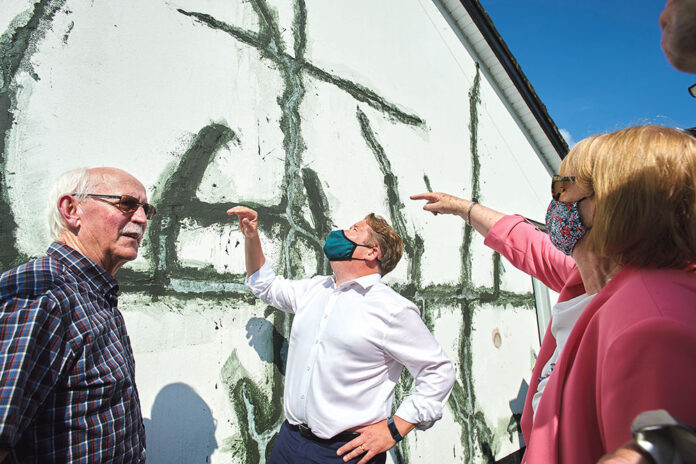THE vice-chairperson of the Clare Pyrite Action Group (CPAG) has urged people to stop suffering in silence if they have defective blocks in their homes.
Mary Hanley told a major conference hosted by the Technological University of the Shannon (TUS) last week that people must open up and share their experiences. Mrs Hanley, who showed the Housing Minister her badly cracked home in Drumline last August, made her comments during a special session dealing with the mental and physical health impacts of living in a house with defective materials.
Referring to a presentation from TUS’s Dr Lorcan Byrne on the impact of housing insecurity and the importance of collective action, Mrs Hanley said that encouraging people to speak up remains a challenge. “Dealing with officialdom is one of the biggest stressors facing our group of homeowners,” she said.
“A lot of us in Clare – and in Mayo and Donegal – would love to just go home and close the door, but it’s been impossible to close the door for the last couple of weeks, because the blocks are moving again. Nearly 1,000 homes in Clare have this issue and we’d love to go home and switch off, but all we can see are the cracks and the mould.”
The retired school principal repeated her call for others to join the CPAG, if their homes are affected.
“So many people are suffering in silence,” she said. “They’re embarrassed about the state of their homes and haven’t even registered with the CPAG. That’s a shame because the only way we can work is together as a group. One of our biggest issues is getting people to open up and tell us how they feel.”
Dr Bryne, who is a sociologist and member of the board of the Midwest Simon, expressed his solidarity with everyone affected by defective blocks. “What an incredibly insecure situation it must be,” he said. “You have a big body of work to do in terms of advocacy.”
Dr Byrne outlined the national and international research on the impact of housing insecurity and noted the emotive nature of the topic. He referred to studies in Wales, Sweden and America, showing a greater prevalence of mental and physical illness among those facing uncertainty over housing.
“Only a collective response will be impactful,” he said. “There is a huge need for solidarity, given the impact on health and wellbeing of you and your families. Dealing with officialdom is itself a point of extreme stress – if done alone. Collective action is a requirement for both wellbeing and effective advocacy.”
A presentation on the physical health impact of defective blocks was given by Killaloe native GP, Dr Michael Carmody. He outlined how his parents had built the family home in 1989 and began to see cracks a decade later. “The roof has been replaced,” Dr Carmody outlined.
“Parts of the walls are falling down. In my old bedroom, the roof is almost off. It’s turning into a balcony.”
Dr Carmody said that while the issue had been going on for 25 years, the appearance of black mould, Stachygotrys Charturum, was a concern for the last decade. The fungus is linked, he explained, to a range of upper airway ailments, worsening of asthma, recurrent vertigo, brain fog, muscle pain and other issues. “We haven’t been able to shift the mould due to the condition of the blocks,” he said.
The impact of defective housing on mental health and relationships was discussed in a conference presentation from Cyril Hyland, CEO of Let’s Get Talking. The psychotherapist noted the “absolute requirement for shelter and security”.
“The whole idea of a home is a lifelong project,” he said. “The quality of housing is very much a factor in stress and mental health conditions.”
Mr Hyland said that the mission of his organisation is to remove barriers to counselling and pledged to work collectively and individually with affected homeowners.
Psychologist, Dr Lisa O’Rourke Scott, who chaired the conference session, commended Mr Hyland’s offer. “Things people are experiencing like anger, rumination and unrealistic thoughts of catastrophe are totally understandable,” she said.
“If you’re feeling that way, it’s not you, it’s the situation. Sometimes it can help people to say, ‘This is the way I’m feeling and it’s reasonable, but it’s just a feeling’. At the same time, if there is an opportunity for psychotherapy, with Let’s Get Talking, I would highly recommend it.”
Full recordings of the conference are available on the Facebook page of Clare Pyrite Action Group.

